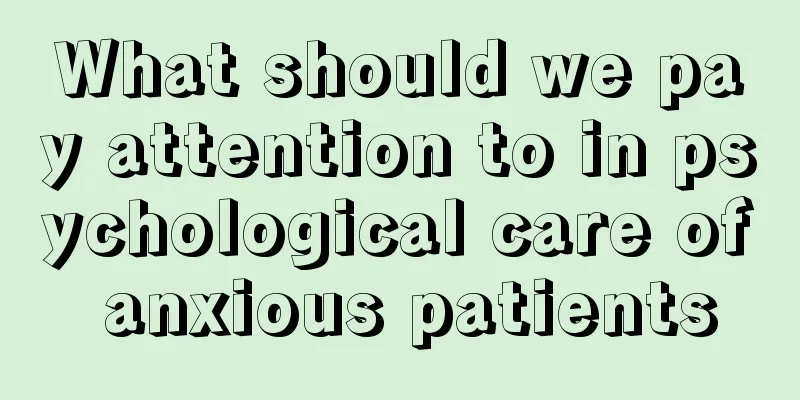What should we pay attention to in psychological care of anxious patients

|
Being a psychological nurse for anxious patients is an extremely troublesome task. Anxious patients themselves have extremely unstable moods, which can easily cause great difficulties for the nursing work of nursing staff. Anxious patients are extremely difficult to communicate with and are prone to losing their temper and anger, so it is important to grasp the patient's psychology when caring for anxious patients. Causes of anxiety reactions in hospitalized patients: (1) Belief that one’s illness is serious and may endanger one’s life or bring about adverse consequences, and one is anxious and uneasy about the illness. (2) They develop a fear of the doctor’s diagnosis, treatment plan, and nursing measures, fearing that a misdiagnosis or inappropriate treatment may lead to side effects. (3) The patient is not adapted to the hospital environment and is not used to the living environment. The original life pattern is disrupted. For example, the patient has to sleep in the same room with multiple people and is watched by nursing staff, which causes insomnia, anxiety and restlessness. (4) Anxiety exists as a symptom of a disease, such as menopausal syndrome, hyperthyroidism, hypoparathyroidism, primary hypertension, cerebrovascular disease, vitamin B12 deficiency, hypoglycemia, etc., which often have anxiety symptoms. Psychological care for anxiety reactions in hospitalized patients: Patients' anxiety reactions have a great impact on normal diagnosis and treatment. Therefore, they must be taken seriously and eliminated as soon as possible. (1) Carefully observe the patient's anxiety reactions and manifestations, and formulate appropriate nursing measures based on the causes of the patient's anxiety. (2) Let the patient understand his disease diagnosis, treatment plan, procedures, the necessity, reliability and safety of various examinations and treatment methods as early as possible to dispel his concerns. (3) Make patients feel respected, introduce the hospital environment to them, and arrange and organize some appropriate activities so that patients can receive treatment with peace of mind in a warm, friendly and caring environment, thereby reducing their anxiety reactions. Nursing methods: 1 When the patient is severely anxious, he or she should be placed in a quiet and comfortable room to avoid disturbance. The surrounding facilities should be simple and safe, and it is best to have someone on duty to look after it. 2. Closely observe changes in physical condition and record them. When the patient's emotions are stable, psychological care should be provided to the patient without delay. To comfort and calm the patient's emotions. 3. For patients with physical diseases, it is necessary to explain to them that intense emotions will have adverse effects on the body. Allow patients to subjectively control their emotional responses. Pay attention to close monitoring of vital signs. 4 Elderly patients with serious physical illnesses should be closely monitored. It is also necessary to adjust the dietary structure, increase the intake of nutrients, and increase the supplement of calcium foods to prevent fractures. 5. Use good nursing communication skills on a daily basis. Pay attention to listening to the patient's complaints and allow the patient to express his or her emotions appropriately. To prevent bad emotions from outbursts and affecting physical health. 6 It should be fully recognized that anxiety disorder is not an organic disease and does not pose a direct threat to human life. Therefore, patients should not have any mental stress or psychological burden. 7 To build confidence in overcoming the disease, patients should firmly believe that the things they worry about do not exist at all, and that the disease can be completely cured after proper treatment. 8 Under the guidance of a doctor, learn to regulate emotions and self-control, such as mental relaxation, diverting attention, and eliminating distracting thoughts, so as to achieve a state of letting nature take its course and being calm. 9. Learn how to correctly handle various emergency events and enhance psychological defense capabilities. Cultivate a wide range of interests and hobbies to make your mood open and cheerful. 10. Whenever possible, seek care and support from family members, colleagues, and organizations to resolve specific issues that may cause anxiety. |
<<: What are the treatment principles for left ventricular hypertrophy
>>: What are the benefits of soaking your feet in ginger water in winter
Recommend
What to do if dentures fall out
We use teeth to chew food, but in life, many peop...
Six major hazards of bad breath!
Is bad breath just a problem of breath? Is bad br...
How to exercise with high blood lipids? Teach you 4 exercise methods for high blood lipids
With the development of society, high blood lipid...
Can children drink chrysanthemum tea?
Children are generally not allowed to drink chrys...
How to treat nasopharyngeal cancer?
How is nasopharyngeal cancer treated? 1. After ra...
There are white worms in the live shrimp
Shrimp is a very common seafood. It is rich in ca...
What are the symptoms of prostate cancer in the early stages?
Cancer is the biggest culprit affecting human hea...
Drug treatment for esophageal cancer
The proliferation cycle of normal esophageal epit...
What diseases does the infectious disease department include?
In any hospital, there are many departments. Diff...
How to deal with itching after moxibustion
Moxibustion is a very good traditional Chinese me...
Is local ablation effective in treating liver cancer? What are the advantages of TCM in treating liver cancer?
Is local ablation effective for liver cancer? Loc...
How to diagnose tuberculosis
Many major diseases require multi-faceted examina...
What causes black spots on teeth
In life, there are always some people who have so...
Pain when swallowing on the right side of your throat?
Pain in the throat when swallowing may be caused ...
How to prevent prostate cancer in the elderly
Prostate cancer is a disease of elderly men. Its ...









